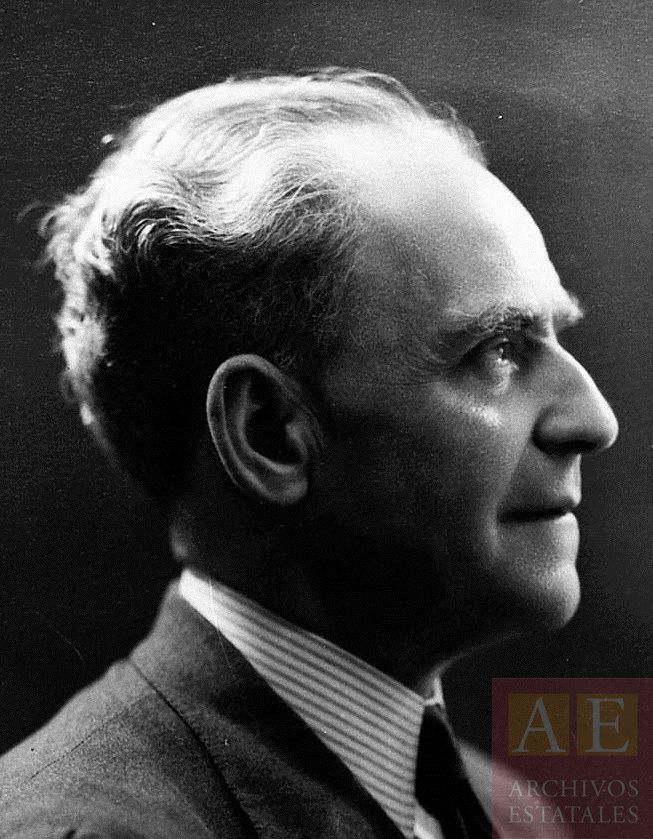 Persona - Benedito, Rafael (1883-1963)
Persona - Benedito, Rafael (1883-1963)
Identificación
Tipo:
Persona
Forma autorizada:
Benedito, Rafael (1883-1963)Otras formas
Fechas de existencia:
València (España) 1883-09-03 - Madrid (España) 1963-09-08
Historia:
Pedagogo, director de orquesta y coro, folclorista y compositor español.
Nació en Valencia el 3 de septiembre de 1883. Hijo de José María Benedito Mendoza, taxidermista, y hermano de José María, Luis y Manuel, este último pintor.
Estudió con Amancio Amorós y Pedro Sosa en el Conservatorio de Valencia y desde 1904 en el Real Conservatorio de Música y Declamación de Madrid con Vicente Arregui, del que fue discípulo. Fue pensionado por el Ministerio de Instrucción Pública para estudiar en Francia y Alemania pedagogía musical, especializándose en este segundo país en dirección de coro y orquesta.
Convencido del valor pedagógico y cultural de la música, se dedicó desde muy joven a la formación de orquestas y coros, como la de Amigos de la Música (1915), más tarde llamada Orquesta Benedito, o la Masa Coral de Madrid (1919), primer orfeón integrado por voces mixtas en la capital de España. Con estas formaciones, fueron famosos sus conciertos matinales, programados para difundir la música de compositores españoles, así como la del repertorio internacional como el ciclo de las 9 sinfonías de Ludwig van Beethoven.
Dedicó gran parte de sus actividades a la educación musical: fue profesor de música en los colegios de San Isidoro y San Ildefonso y en el reformatorio Príncipe de Asturias; también en la Universidad Central de Madrid desde 1927, año en el que creó los coros universitarios. Sus conferencias de divulgación musical, cursillos de pedagogía y enseñanzas sobre la canción popular española hicieron del Instituto-Escuela de Madrid el más moderno centro pedagógico de su tiempo.
Desde 1925 desempeñó el cargo de inspector general de Enseñanza de Música del Ayuntamiento de Madrid. En Ginebra asistió a uno de los cursos prácticos de rítmica que impartía Jacques Dalcroze, dentro del 1er Congrès du rythme (1926). En 1927 organizó y dirigió los Coros Municipales Lucentinos, dando numerosos conciertos en Lucena (Córdoba), Córdoba y Málaga. Impartió un curso práctico de rítmica (1929) y creó la Orquesta Universitaria Escolar. El Ministerio de Instrucción Pública le nombró en 1931 profesor adjunto; fundó en Madrid la Escuela Coral Municipal y fue asesor de música de la Sección Femenina de Falange desde 1937.
Su tarea como compositor se centró principalmente a la búsqueda y armonización del folclore español. Publicó varias colecciones de cantos populares españoles y canciones infantiles en Unión Musical Española, Ediciones Hispania y Sección Femenina. Fue autor de numerosos artículos en diarios y revistas, dedicados a la iniciación, el conocimiento y la comprensión de la música, como Revista de Pedagogía, además de ejercer como redactor jefe de Lira Española y asesor y colaborador del Diccionario Enciclopédico de la Música.
En 1944, el Ministerio de Educación Nacional le concedió la Cruz de Alfonso X el Sabio, también recibió la de Isabel la Católica y la Medalla de Madrid. Falleció en Madrid el 8 de septiembre de 1963.
Contexto:
Una parte de su archivo personal, con documentos de 1907 a 1966, se encuentra depositada en la Asociación para la investigación musical Rafael Benedito Vives (Salamanca). Cuenta con correspondencia, manuscritos, prensa y programas de mano, además de documentación personal y profesional.
En la Biblioteca Musical Víctor Espinós del Ayuntamiento de Madrid se conserva el fondo documental de la Masa Coral de Madrid, creada en 1919 por Rafael Benedito.
Ocupaciones
Profesión (Es realizada por):
Profesión (Es realizada por):
Lugares
Lugar de Nacimiento:
Lugar de Defunción:
Conceptos/Objetos/Acontecimientos
Fuentes
Sobrino, Ramón. "Paisaje musical de Madrid en el primer tercio del siglo XX: las instituciones orquestales y la Banda Municipal de Madrid", en Recerca Musicològica XIV-XV, 2004-2005, pp. 155-175.
Relaciones
Relaciones asociativas :
Relaciones familiares :
Enlaces Externos
Catálogo de Autoridades:
Fichero de Autoridades:
Fichero de Autoridades:
Documentos
Productor de:
- No hay Unidades de Descripción asociadas.






